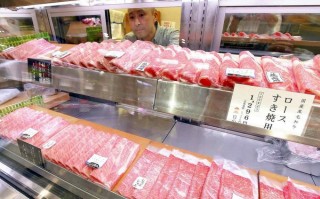Loading
Search
▼ Japan Eyes Huge Market with China Set to Resume of Japanese Beef Imports; Japan Govt Hopes to Nearly Double Beef Exports by 2030
- Category:Gourmet
With China expected to resume importing Japanese beef, it is a huge step forward for the Japanese government, which aims to increase exports of agricultural, forestry and fishery products.
A Japan-China agreement on an animal health and quarantine took effect Friday, paving the way toward the resumption of Japanese beef exports to China.
However, it is still uncertain when beef shipments to China will actually resume, as the two countries have to hold further discussions regarding product safety and quarantine procedures.
China suspended imports of Japanese beef following an outbreak of bovine spongiform encephalopathy in Japan in 2001. In November 2019, the two countries signed an agreement on cooperation in animal health and quarantine, a necessary step before exporting livestock products.
However, China did not take further steps to resume imports, so the agreement was not able to take effect.
Ahead of resuming exports, Japan’s food safety procedures need to be evaluated by China. It will also be necessary to finalize specific conditions for export products, such as the meat processing method and hygiene control.
“The conditions necessary to resume exports will depend on what the Chinese side asks for,” said an agriculture ministry official. “It’s still uncertain when we will be able to resume exports.”
Japan’s exports of agricultural, forestry and fishery products exceeded ¥1.5 trillion in 2024. The government set a goal to more than triple the figure to ¥5 trillion by 2030.
While beef exports stood at ¥64.8 billion in 2024, the government hopes to almost double the figure to ¥113.2 billion by 2030.
By country and region, the United States was the largest importer of Japanese beef at ¥13.4 billion in 2024, followed by Taiwan at ¥11.2 billion, Hong Kong at ¥8.4 billion and Cambodia at ¥6.7 billion.
Exports of Japanese beef has nearly doubled compared to 2019 as a result of the surging global popularity of washoku Japanese cuisine.
It has been pointed out that Japanese beef still reached China through Cambodia following China’s suspension of its import. If China officially resumes importing Japanese beef, it will become possible for Japan to export the product directly to China, a massive market with a population of 1.4 billion.
The resumption may drastically increase Japanese beef exports.
“As China has such a large population, there will be a high demand for Japanese beef,” said an official of the Japan Livestock Products Export Promotion Council.
A Japan-China agreement on an animal health and quarantine took effect Friday, paving the way toward the resumption of Japanese beef exports to China.
However, it is still uncertain when beef shipments to China will actually resume, as the two countries have to hold further discussions regarding product safety and quarantine procedures.
China suspended imports of Japanese beef following an outbreak of bovine spongiform encephalopathy in Japan in 2001. In November 2019, the two countries signed an agreement on cooperation in animal health and quarantine, a necessary step before exporting livestock products.
However, China did not take further steps to resume imports, so the agreement was not able to take effect.
Ahead of resuming exports, Japan’s food safety procedures need to be evaluated by China. It will also be necessary to finalize specific conditions for export products, such as the meat processing method and hygiene control.
“The conditions necessary to resume exports will depend on what the Chinese side asks for,” said an agriculture ministry official. “It’s still uncertain when we will be able to resume exports.”
Japan’s exports of agricultural, forestry and fishery products exceeded ¥1.5 trillion in 2024. The government set a goal to more than triple the figure to ¥5 trillion by 2030.
While beef exports stood at ¥64.8 billion in 2024, the government hopes to almost double the figure to ¥113.2 billion by 2030.
By country and region, the United States was the largest importer of Japanese beef at ¥13.4 billion in 2024, followed by Taiwan at ¥11.2 billion, Hong Kong at ¥8.4 billion and Cambodia at ¥6.7 billion.
Exports of Japanese beef has nearly doubled compared to 2019 as a result of the surging global popularity of washoku Japanese cuisine.
It has been pointed out that Japanese beef still reached China through Cambodia following China’s suspension of its import. If China officially resumes importing Japanese beef, it will become possible for Japan to export the product directly to China, a massive market with a population of 1.4 billion.
The resumption may drastically increase Japanese beef exports.
“As China has such a large population, there will be a high demand for Japanese beef,” said an official of the Japan Livestock Products Export Promotion Council.
- July 12, 2025
- Comment (0)
- Trackback(0)


